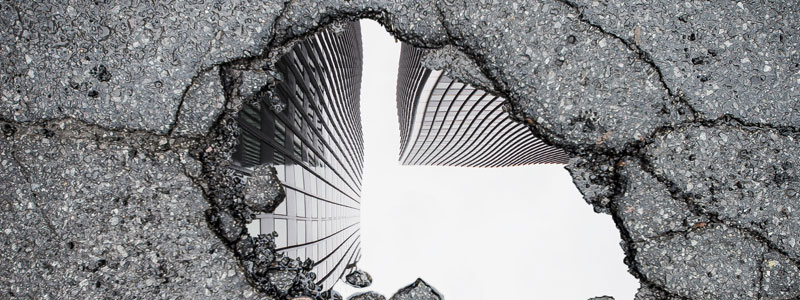Is Indiana’s Government Responsible for Poor Road Conditions?
Every Indiana resident has likely complained about them at some point, whether they travel on country roads or in the thick of Indianapolis traffic: potholes. This spring saw some of the worst road conditions in recent memory, with major streets, highways, and even on-ramps nearly impassable because of cavernous, axle-breaking holes in the road. Then, […]

October 1, 2018

Every Indiana resident has likely complained about them at some point, whether they travel on country roads or in the thick of Indianapolis traffic: potholes.
This spring saw some of the worst road conditions in recent memory, with major streets, highways, and even on-ramps nearly impassable because of cavernous, axle-breaking holes in the road. Then, during the summer, Indianapolis suffered road closures in the heart of downtown due to sinkholes creating huge sections of unstable roadway.
We’re grateful for the city and highway crews who worked around the clock to help make our commutes safer, but many people wonder why our roads were allowed to get this bad in the first place. Perhaps the most curious among us are those who suffered property damage or even injury due to the terrible road conditions. Indianapolis residents have a right to know, whether they face a mounting pile of mechanic or medical bills, if the city is responsible for maintaining its public roads.
Road Condition Damage Liability

Beyond potholes and sinkholes, cars can be damaged by a few other road factors, including excessive gravel from chip-seal, sharp shoulder drop-offs, and uncertain conditions around construction zones.
Sometimes, the government in the road’s jurisdiction can be held liable for damage and injuries caused directly by road conditions, but there are a few other parties that could be involved as well.
Proving Government Liability for Poor Road Conditions
Though the municipality, city, or state in charge of keeping the road is responsible for providing safe driving routes for residents, the responsible entity may not always be liable for damage or injury caused by their roads.
The key distinguishing factor when evaluating whether a government is liable for car damage or injury caused by the road conditions is whether the government should have known about the issue. Under the law, the government is granted a reasonable amount of time to discover the issue, whether through reports from individuals or through regular road inspections.
In addition, the government is also granted a reasonable amount of time to fix the condition in question. For drivers in Indiana, the sheer number and severity of potholes overwhelmed public works departments’ capacity to patch them all, so even if it took a month for the pothole in your neighborhood to be filled, the government may not be liable for the flat tire it caused your car because they were likely working as fast as they could. Their response could be considered “reasonable” under the law.
Filing a Strong Claim Against the Government

You must prove two key things in your property damage claim for poor Indiana road conditions if you want a shot at settling it in court:
- The poor road condition directly caused damage or injury to your car or you.
- The government knew about the condition and had reasonable time to respond.
As soon as you discover damage to your car, you should inspect and record exactly what damage has occurred, as well as record the circumstances surrounding the poor road condition.
Information to Gather About Poor Road Conditions in Indiana
Every case is different. If possible, gather as much data as you can, including these types of measurements and information:
- Size of the road hazard (take pictures)
- Direction and speed you were traveling when the damage occurred
- Make, model, and year of the car you were driving
- Type and severity of damage (take pictures)
- Type and severity of injuries (take pictures and seek medical treatment)
- Name of the road and nearby address
- Names and contacts of witnesses or other drivers who have encountered the hazard
To help prove the government should have known about the condition, ask people nearby or other drivers whether they have reported the condition and when they first remember the hazard appearing.
No matter whether you may be able to successfully settle a damage or injury claim with an Indiana city for poor road conditions, you should still report it. This shifts responsibility to the government to fix the condition before other drivers are affected.
Help Filing an Indiana Car Accident Claim
Bad roadways are an everyday experience for many Hoosiers, but the laws, procedures, and history of the conditions around the state are highly complicated, and can often frustrate injured people who have other priorities than going door to door to ask people about potholes.
That’s why working with one of Hensley Legal Group’s experienced car accident attorneys can take some of the burden of filing a claim off of your shoulders. Not only will we take care of the leg work on your injury claim, we also will be able to better pinpoint which government entity may be liable and how to best approach the claims process. Call us or contact us online today to get started with a free conversation with our attorneys.